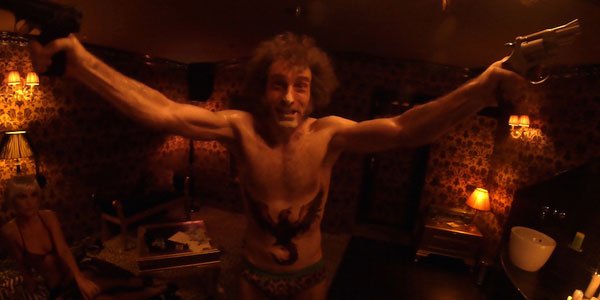The Great Lengths Hardcore Henry Went To Prevent Audience Motion Sickness

Your Daily Blend of Entertainment News
You are now subscribed
Your newsletter sign-up was successful
An interesting problem that has developed in the world of modern cinema has been the increased use of hand-held cameras and the issue of nausea that it can create. Films like The Blair Witch Project and Cloverfield are famous examples, but some movie-goers have even take some issue with the cinematography featured in Paul Greengrass’ Bourne titles. You’d think that this would be a serious issue for the new action movie Hardcore Henry - which plays out entirely in first person – but the reason it doesn’t is because a great deal of experimentation and testing was done to make sure it wouldn’t.
In advance of Hardcore Henry’s release this week, I had the opportunity to hop on the phone with producer Timur Bekmambetov (best known as the director of Wanted and Abraham Lincoln: Vampire Slayer) and while we touched on a number of topics – including his upcoming remake of Ben-Hur - one subject was the process to make sure nobody was throwing up because of Hardcore Henry. As he explained the work began long before production on the film itself actually started:
Yes, it was a long process, because we made a lot of tests and test screenings before we shot the movie. And it was smart Russian people… they invented these special palettes with a stabilization system, because it’s a very interesting magnetic stabilization system, helping us to avoid the crazy shaking. And it was not just adventure, there was a very specific plan of how to make it and we did a lot of reshoots. We did a lot of changing, keeping in mind that we’re dealing with a very different kind of camera work.
Similar to what we regularly write in our reviews of 3D movies, everybody’s reaction to Hardcore Henry is going to be different simply because we all have different levels of sensitivity. Speaking personally – admittedly having never felt the ill effects of hand-held camera work – I can say that I felt perfectly fine watching Hardcore Henry, and had a blast watching it.
As Timur Bekmambetov further discussed, however, preventing the possibility of motion sickness was only one of the issues that had to be sorted out with the aid of extensive experimentation. In making the film play out from a single perspective, director Ilya Naishuller and the crew essentially had the cameraman playing two important, yet very distinct roles: one as a piece of cinematography equipment, meant to capture the scene with proper impact and coverage; and the second as the titular character, Henry, who we obviously follow throughout the entire story. The producer explained,
What’s interesting by the way, it’s not only about the shakiness. It’s about a unique way of operating the camera because the camera man, he’s an actor and cameraman at the same time. It’s difficult for us, because of the conflict of interest. As an actor, you should, because the only way how we can connect to the character, when you feel every move, every turn is a part of the journey. And at the same time, it’s camera work, because you need to capture events around you. It was very important to find the right balance between these two tasks, because if you’re too much the camera man, then you will lose the character. You’ll lose too much of the character, you’ll lose what is around you… It was three years of learning.
You can soon see how those three years of work panned out for the production of Hardcore Henry, as the film will be out in theaters nationwide this Friday, April 8th.
Your Daily Blend of Entertainment News

Eric Eisenberg is the Assistant Managing Editor at CinemaBlend. After graduating Boston University and earning a bachelor’s degree in journalism, he took a part-time job as a staff writer for CinemaBlend, and after six months was offered the opportunity to move to Los Angeles and take on a newly created West Coast Editor position. Over a decade later, he's continuing to advance his interests and expertise. In addition to conducting filmmaker interviews and contributing to the news and feature content of the site, Eric also oversees the Movie Reviews section, writes the the weekend box office report (published Sundays), and is the site's resident Stephen King expert. He has two King-related columns.
